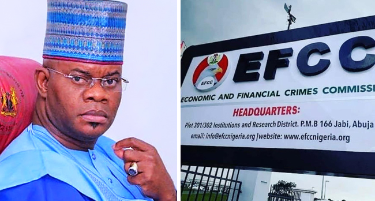In a recent development at the Federal High Court in Abuja, the arraignment of former Kogi State Governor Yahaya Bello on charges of money laundering, brought by the Economic and Financial Crimes Commission (EFCC), has been postponed to June 27, 2024. This adjournment follows an agreement between the legal representatives of both parties.
Initially, today, June 13, 2024, was set for the arraignment at the behest of the EFCC’s legal team. However, during the resumed hearing on Thursday, Bello’s lawyer, Adeola Adedipe, informed the court that EFCC’s lead counsel had communicated that the June 13 date was inconvenient. He stated that both parties had concurred in a meeting that the arraignment should be moved to June 27 for practical reasons.
Adedipe expressed his surprise at the apparent miscommunication within the EFCC’s legal team. He noted that while Kemi Phinhero, the EFCC’s lead counsel, had agreed to the new date, Rotimi Oyedepo, who appeared in court for the EFCC, seemed unaware of this arrangement. Oyedepo clarified that he was not informed of any such meeting or agreement outside the court proceedings to postpone the arraignment.
Despite this confusion, Justice Emeka Nwite adjourned the case to June 27, 2024, based on an undertaking from Adedipe that Bello would be present in court on that day. Justice Nwite highlighted that typically, an out-of-court agreement to reschedule a date would not override an existing court order. Nonetheless, he proceeded with the adjournment given the circumstances presented.
The backdrop to this case involves a series of dramatic events. Yahaya Bello served as the Governor of Kogi State from January 27, 2016, until January 27, 2024, when he handed over to his successor from the All Progressives Congress (APC), Usman Ododo. Following his tenure, Bello faced increasing scrutiny from the EFCC regarding allegations of financial misconduct.

On April 17, 2024, the EFCC’s efforts to apprehend Bello escalated when armed operatives surrounded his residence in Abuja, intending to arrest him. However, in a surprising turn of events, his successor, Usman Ododo, reportedly arrived and managed to escort Bello away from the scene. This incident led to the EFCC declaring Bello wanted and issuing a stern warning that any obstruction of its operations would not be tolerated.
The Attorney General of the Federation and Minister of Justice, Lateef Fagbemi, supported the EFCC’s stance, advising Bello to surrender himself to the authorities. Fagbemi’s endorsement of the EFCC’s actions underscored the federal government’s commitment to ensuring accountability and upholding the rule of law.
The postponement of Bello’s arraignment underscores the complexities and procedural intricacies often encountered in high-profile legal cases. As the new date approaches, all eyes will be on the Federal High Court in Abuja to see how the proceedings unfold. The case against Bello is not just a test of the legal system’s efficacy in handling corruption charges but also a critical moment for the EFCC and its mandate to combat financial crimes in Nigeria.
For followers of this legal saga, the developments on June 27, 2024, will be pivotal. The proceedings promise to offer more insights into the alleged financial misdeeds during Bello’s tenure and the legal strategies both the defense and prosecution will employ. As always, the case serves as a reminder of the importance of transparency and accountability in public office, and the ongoing efforts to ensure that those entrusted with power are held to account for their actions.




